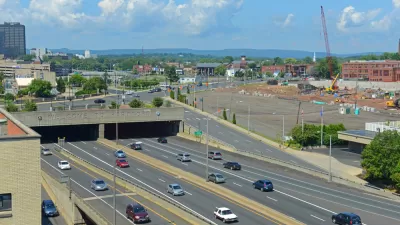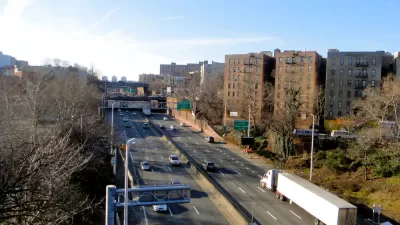A $435 billion "economic justice" bill proposed by Democrats in the U.S. Senate includes $10 billion for projects that remove highways and build community-oriented assets in their place.

Kea Wilson reports: "Shortly before the holiday recess, then-Senate minority leader Chuck Schumer and a coalition of 25 Democratic senators introduced a $435 billion economic justice bill called S5065 that included a $10-billion pilot program aimed at helping communities tear down urban highways, and rebuild the surrounding neighborhoods with the needs of underserved communities in mind."
The "Restoring Neighborhoods and Strengthening Communities Program," known among advocates as the "Highways to Boulevards" initiative, would only be available in areas with large numbers of low-income residents and people of color.
The program is designed to avoid a top-down planning approach to the process of rebuilding. "Perhaps most critically, the initiative would make significant funds available specifically for the 'community engagement and capacity building' necessary to identify what underserved residents actually want to do with all the valuable land freed up when freeways are torn down," according to Wilson.
The program would also enable the creation of community land trusts. "[A]dvocacy groups, like Transportation for America, have heralded community land trusts as an essential companion to tear-down grants," according to Wilson.
The article includes a lot more detail about the benefits of tearing down urban highways and includes some speculation about how much progress can be made to advance the cause under the Biden administration and with Pete Buttigieg at the helm of the U.S. Department of Transportation.
FULL STORY: Senate Considering $10B for Highway Removal

Alabama: Trump Terminates Settlements for Black Communities Harmed By Raw Sewage
Trump deemed the landmark civil rights agreement “illegal DEI and environmental justice policy.”

Study: Maui’s Plan to Convert Vacation Rentals to Long-Term Housing Could Cause Nearly $1 Billion Economic Loss
The plan would reduce visitor accommodation by 25% resulting in 1,900 jobs lost.

Why Should We Subsidize Public Transportation?
Many public transit agencies face financial stress due to rising costs, declining fare revenue, and declining subsidies. Transit advocates must provide a strong business case for increasing public transit funding.

Paris Bike Boom Leads to Steep Drop in Air Pollution
The French city’s air quality has improved dramatically in the past 20 years, coinciding with a growth in cycling.

Why Housing Costs More to Build in California Than in Texas
Hard costs like labor and materials combined with ‘soft’ costs such as permitting make building in the San Francisco Bay Area almost three times as costly as in Texas cities.

San Diego County Sees a Rise in Urban Coyotes
San Diego County experiences a rise in urban coyotes, as sightings become prevalent throughout its urban neighbourhoods and surrounding areas.
Urban Design for Planners 1: Software Tools
This six-course series explores essential urban design concepts using open source software and equips planners with the tools they need to participate fully in the urban design process.
Planning for Universal Design
Learn the tools for implementing Universal Design in planning regulations.
Smith Gee Studio
Alamo Area Metropolitan Planning Organization
City of Santa Clarita
Institute for Housing and Urban Development Studies (IHS)
City of Grandview
Harvard GSD Executive Education
Toledo-Lucas County Plan Commissions
Salt Lake City
NYU Wagner Graduate School of Public Service





























